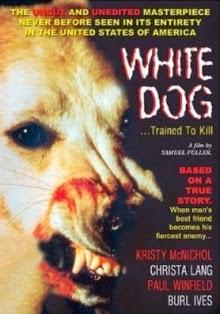
Directed By: Samuel Fuller
Starring: Kristy McNichol, Paul Winfield, Burl Ives
Tag line: "When man's best friend becomes his fiercest enemy... "
Trivia: Five white German Shepherd dogs played the unnamed central "White Dog" character
During his 40+-year career, writer / director Samuel Fuller never shied away from controversy, tackling such issues as patriotism (Pickup on South Street), mental illness (Shock Corridor), even homosexuality (which he alludes to in his 1955 film, House of Bamboo). Yet, of all his movies, the most provocative is 1982’s White Dog, a picture that deals with racism in a way that had never been seen before.
While out driving one night, struggling actress Julie Sawyer (Kristy McNicol) accidentally hits a stray dog. After taking the injured animal to a veterinarian hospital for treatment, she brings it home with her, watching over it until she can find its rightful owner. But when the dog saves her from a would-be rapist, Julie considers adopting it herself. That is, until she discovers her new pal has one very serious flaw: it viciously attacks every black person it meets! As it turns out, the animal is what is commonly referred to as a “white dog”, trained by a racist to attack African Americans on sight. Not willing to give up on the misguided canine, Julie looks for someone willing to “re-condition” it, a search that leads her to a trainer named Keys (Paul Winfield), who also happens to be black. Having had prior experience with white dogs, Keys makes it his personal mission to break the animal of its hatred, even if doing so means putting his own life on the line.
A nail-biting thriller, White Dog shows us racism in its most visceral, violent form. At times, it’s a tough movie to watch, especially the scenes where Keys attempts to re-educate the dog (mostly because his efforts usually end in failure, leading us to wonder if he’s fighting a losing battle). What’s more, the film toys with our emotions: like Julie herself, we go from feeling sorry for the dog (which clearly had no control over its training) to wanting to see it destroyed (at one point, it breaks free and mauls an elderly black man to death inside a church). More than a commentary on bigotry, White Dog reveals the effects of hatred, and how deeply engrained it can become, forcing us to confront the very unpleasant reality that, even if Keys, by some miracle, experiences a breakthrough, there’s no guarantee the dog can ever really be trusted.
This concept proved far too controversial for the executives at Paramount, who, fearing protests from groups like the NAACP, refused to release White Dog (it wasn’t until 2008, when the movie finally premiered on DVD, that U,S. audiences got a chance to see it in its original, uncut form). While certainly challenging, White Dog is also one of the most thought-provoking films ever made about racism, which, from the looks of it, may be more difficult to stamp out than we imagined.
